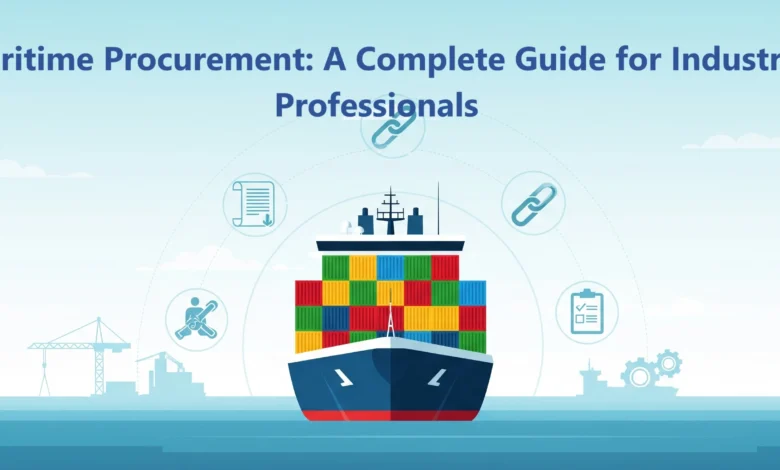Maritime Procurement in 2025: A Complete Guide for Industry Professionals

Last Updated on August 28, 2025 by Prabhakar A
The maritime industry is evolving rapidly, driven by advancements in technology, regulatory changes, and the growing need for sustainability, all of which are influencing shifts in procurement strategies. In 2025, maritime procurement professionals are facing both challenges and exciting opportunities. Sourcing marine spare parts, equipment, or services, requires understanding the current trends and best practices to stay competitive in the ever-changing marine landscape.
Let us delve into what maritime procurement is, why maritime procurement is important, the impact of digitization on procurement, sustainability in procurement, role of strategic partnerships in procurement, centralized procurement, and geopolitical risks in procurement.
Learn more: The Top Six Benefits of A Business Management Software
Table of Contents
What is maritime procurement?
Maritime procurement refers to the process of sourcing, purchasing, and managing the supply of goods, equipment, and services essential for the operation, maintenance, and safety of ships and marine infrastructure. This includes everything from engine parts and navigation systems to safety gear, lubricants, and ship repair services. Effective maritime spare parts procurement ensures vessels remain seaworthy, compliant with international regulations, and operationally efficient, while also managing costs, supplier relationships, and delivery timelines across global shipping routes.
Why is maritime procurement important?
Maritime procurement is vital because it ensures the timely and efficient acquisition of critical equipment, spare parts, and services that keep vessels operational and compliant with international regulations. With ships operating in demanding marine environments, dependable procurement minimizes downtime, supports safety, and optimizes cost-efficiency by sourcing the right products from trusted marine spare parts suppliers. It also plays a key role in maintaining supply chain continuity for global maritime trade.
The impact of digitalization on procurement
In recent years, digital transformation has reshaped procurement processes across industries, and the maritime sector is no exception. In 2025, marine procurement will increasingly rely on advanced technologies like AI, machine learning, and blockchain to streamline sourcing, reduce costs, and improve transparency.
Key trends in digitization of procurement
- AI and predictive analytics tools are transforming how procurement professionals forecast demand, identify potential suppliers, and optimize inventory management. Predictive analytics also help anticipate maintenance needs, reducing downtime and operational costs
- Blockchain technology ensures the authenticity of marine equipment and spare parts, providing a secure, transparent system for tracking orders and transactions. This is especially beneficial for high-value goods where provenance and safety are critical
- Automation tools, such as robotic process automation (RPA), are helping procurement operators handle repetitive tasks like order processing and invoice reconciliation, freeing up time for more strategic decision-making
Sustainability in maritime procurement
As the maritime industry is under increasing pressure to reduce its carbon footprint, sustainability is becoming a focal point of procurement strategies. From eco-friendly vessels to energy-efficient equipment, sustainability will be at the heart of procurement decisions in 2025.
Key considerations:
- Maritime procurement professionals will need to prioritize sourcing environmentally friendly procurement technologies, including low-emission engines, fuel-efficient parts, and sustainable shipbuilding materials
- The carbon footprint of products, from production to disposal, will be a key criterion in procurement decisions. Lifecycle assessments help identify opportunities for reducing environmental impact and selecting products that align with sustainability goals
- Increased regulation surrounding emissions and waste management will influence procurement choices. Maritime professionals must stay informed about evolving global regulations and ensure their procurement practices align with them
The role of strategic partnerships and supplier collaboration
In 2025, effective maritime procurement will rely on strong relationships with trusted suppliers and service providers. Rather than focusing solely on cost-cutting, procurement teams will work closely with suppliers to innovate and solve complex challenges.
Best Practices:
- Long-term collaborations with suppliers foster mutual trust and allow for better negotiation terms. These partnerships also enable procurement professionals to stay ahead of trends and receive priority access to the latest technology and parts
- Close collaboration with suppliers helps resolve issues such as delays or quality concerns more efficiently. Joint development of solutions can also lead to improved products and services that benefit both parties
The shift towards centralized procurement
With the global nature of the marine industry, many companies are moving toward centralized procurement systems to gain greater control, visibility, and efficiency. Centralized procurement offers enhanced negotiation power and reduces duplication across multiple departments or locations.
Benefits of centralized procurement:
- A centralized procurement system ensures consistency in purchasing practices, resulting in more standardized procedures and less room for error.
- By consolidating purchases and leveraging bulk buying power, companies can negotiate better terms with suppliers and reduce procurement costs.
- Centralized systems allow for real-time tracking and reporting, which provides valuable insights into procurement performance and opportunities for further optimization.
Navigating geopolitical risks in maritime procurement
The maritime industry is inherently subject to geopolitical risks, from shipping route disruptions to trade wars. In 2025, procurement professionals will need to adopt strategies to mitigate these risks and ensure business continuity.
Risk mitigation strategies:
- Relying on a single supplier or region exposes companies to geopolitical risks. By diversifying the supplier base and considering alternative routes, companies can reduce the impact of disruptions
- Procurement teams must regularly assess potential risks and develop contingency plans. This could include maintaining a buffer stock of critical spare parts and equipment
- Constantly tracking global trade regulations and sanctions will ensure compliance and help identify potential risks early
Learn more: 5 Pillars for Online Reputation Management
What is the future of maritime procurement in 2025 and beyond?
Going forward, the maritime procurement landscape will continue to evolve as new technologies, market trends, and regulatory pressures emerge. Procurement professionals will need to remain agile, adaptable, and forward-thinking to meet the challenges of the next decade by considering:
- As automation continues to advance, procurement professionals can expect even greater efficiencies and cost reductions. AI will play a key role in supplier selection, demand forecasting, and supply chain optimization
- With digital procurement tools becoming more widespread, data security will be a critical consideration. Maritime procurement teams will need to implement robust cybersecurity measures to protect sensitive data and ensure compliance with data protection regulations
- The disruptions caused by the COVID-19 pandemic have highlighted the importance of resilient supply chains. Procurement professionals will focus on strengthening these systems to withstand future disruptions, whether due to pandemics, climate change, or geopolitical instability
Marine spare parts procurement in 2025 will require a balance of traditional expertise and forward-thinking strategies. Embracing digital transformation, sustainability, strategic partnerships, and risk mitigation will be key to navigating the evolving procurement landscape. By staying informed and adaptable, maritime procurement professionals can drive greater efficiency, cost savings, and sustainability in an increasingly complex and competitive global market.
Also know: If You Aim To Be An Entrepreneur, Consider This a Small Guide
Planning to streamline your vessel’s procurement process? Partner with Navallance for the best marine spares and trusted global sourcing. Contact us today to keep your fleet running smoothly.
Comments
0 comments




